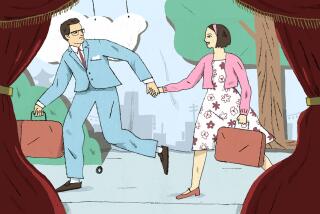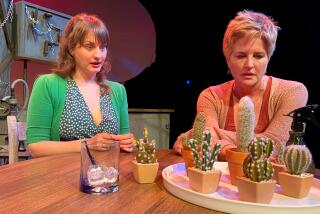The drama of listening
Listening fascinates me. Always has. I sometimes make the excuse for waiting a bit late in the game to start a writing career by saying, “I just listened for 36 years. Then I started writing it all down.”
Some of my most vivid memories of storytelling and compelling human interaction involve being the wide-eyed, open-eared child at the table, listening to my elders tell jokes, quote scripture, read the newspaper, fling accusations, defend opinions, make excuses, reprimand, flatter, terrify, seduce, humiliate, ennoble, inspire, confess and lie.
My Great-Aunt Bertha saw to it that my mother, growing up in the hardscrabble coal country of central Pennsylvania, was given elocution lessons at an early age. Years later, when I was a small child, Mom and Aunt Bertha would “do pieces” for me. I loved listening to them. Still do. If you’ve never heard James Whitcomb Riley’s “Little Orphant Annie” recited to make your eyes pop, your jaw drop and the little hairs on your arm stand up, let me take you to a certain assisted-living facility in Boyertown, Pa., where Great-Aunt Bertha, now 90, needs little prompting to give a private performance. Just ask the maids.
Listening isn’t a passive act. To listen, really listen, takes effort. The payoff is not always what the listener may have hoped for. The result may be wonderful. It may be awful. What is heard, or overheard, may be information that was never intended to land upon the ears: that insight, that sharp observation, that admission of guilt. It may be a vindication, or a call to action; it may soothe, or sting.
The ancient Greeks crowded in amphitheaters to hear myths brought to life by human voices. In my play, “God’s Man in Texas,” a preacher asks to hear God’s whisper. The Greeks not only heard their gods whisper, they could hear them participating in human life, not a bad reward for spending a few hours at the theater.
A few millennia later, the Elizabethans, presented with the most sublime use of language in Western drama, understandably referred to going to the theater as “going to hear a play.”
Then, in the late 1800s, brilliant American director and playwright Augustin Daly broke the centuries-old “stand and declaim” conventions of acting and brought momentum to the act of speaking dialogue. Momentum in speech demanded realism in settings and costumes. Realism became spectacle. Daly put the American West on stage, with all its buttes, mesas, prairies, rivers and waterfalls. His Shakespearean forests had trees that dropped leaves and streams that sparkled. It wasn’t enough for his audience to hear the heroine was in peril; they could see it as Daly actually tied her to the railroad tracks in “Under the Gaslight” -- the first time that particular trick was pulled. In 1888, he debuted the use of electric light on the stage in what must have been an enthralling (and perilous) “A Midsummer Night’s Dream,” strapping acid batteries beneath the fairies’ costumes to illuminate lights in their hair and at the tips of their magic wands.
And audiences no longer said they were going to “hear” a play, they began to “see” a play.
But the innovations of Daly and his imitators soon became old hat, as innovations will. Visceral, psychological, realistic acting -- as evolved from Stanislavsky to the east, and the Group Theatre and Actors Studio here -- became the innovation. Now we didn’t just hear or see a play, we could “feel” it. The art transcended speech and spectacle.
Who, or what, is to blame?
Are audiences still listening? What are they doing during the pre-show announcement to silence pagers and cell phones? Talking? Where once they whispered, now they shout to their companions during the play, perhaps to be heard over the assisted-listening devices plugging their ears. Don’t they realize the crumple of cellophane that sounds so innocuous at home in front of the television sounds like a helicopter taking off in a theater?
Can we blame it all on television? On the general decline in civility and generosity between people in public? Was it the ‘60s? Is it simply that we compete with shortened attention spans in an age in which information and conversation are transmitted at the speed of light? Is that why the form has evolved from the daylong festival to the five-act, from four acts to three, from two acts to the 75-minute one-act play?
Have you heard this tale, a kind of theatrical urban legend? Linda Loman lies across Willy’s grave: “I can’t cry, Willy.” The audience is involved, the actors are on a roll, the words and emotions build toward the big “Free and clear, Willy, we’re free and clear” ... and a cell phone rings in the house. The actors don’t break concentration, but they -- and the rest of the audience -- hear the repeated rings, and, finally, the fumbling to unzip the purse and remove the insistent phone. Does the phone’s owner then turn the ringer off? No. She takes the call, as casually as if she were at home in front of the TV. Everyone in the room can hear. “Hello? ... I’m at a play ... ‘Death of a Salesman’ ... it’s OK.”
Director Anne Bogart and her SITI Company developed “Cabin Pressure,” which they called “a play about an audience.” A character in the play, speaking Bogart’s own words, suggests, “ ... theater is a form of active culture ... an act of leaning forward as opposed to leaning back.”
The Bogart character continues, “For me, the most thrilling experiences in the theater have always been ones where I’ve felt like I’ve had a role to play in this room, where something is asked of me as an audience member, and I have to meet the actors halfway. Because it’s about that, being in the room together, this notion of breathing common air, and that the relationship between the audience and the actor is a circular one.”
That proposal speaks so profoundly to me because it suggests that in our room, the theater, listening to one another is a vital component of the art. The greatest actors aren’t necessarily the ones who just expose the most naked of emotions. Watch Marlon Brando as Stanley Kowalski in the film of “Streetcar,” notice how, after he howls and whimpers for his Stella, he listens. He needs to hear her response, and, in his silence, so do we. Imagine witnessing that moment acted live on the stage, not daring to breathe during that silence with Stanley, with Brando, with Stella, with the audience.
That’s a good example of why the word “pause” can be the most powerful word in a script. Create a pause, a silence, and you allow the audience to come in, so that actors and audience and the play all speak to and listen to one another in the shared silence. The experience is, I think, a divine communion.
I believe that we come to the theater for that communion -- even if armed with cell phones and cellophane -- to try to make some sense of the experience of being human.
Ever since Homo erectus rose to enact the hunt that led to the kill sizzling over the coals, we’ve gathered round that fire for more than warmth or food. When that acting out of the hunt included imitations of the men and women involved, of the prey, of fear, of need, of triumph, we -- in the persons of those ancient peoples -- watched, experienced and listened.
I think listening -- listening to one another and to our planet -- is critical now.
We live in times when things shift as violently as the tectonic plates beneath California: the concepts of security, of who worships the better God, of how old is old enough to die, of what the climate should be, of how fast an idea can be shared, of disease and wellness, of whether it’s significant that a chunk the size of Rhode Island breaks off the Antarctic ice cap -- these concepts are changing rapidly.
And so we gather round the fire; the Gods speak, Aunt Bertha recites, Shakespeare spins gold and the fairies twinkle with never-before-seen illumination. I’m there. You’re there. And, together, we’re listening.
(Pause)
We’re listening.
*
David Rambo is a playwright based in Los Angeles. His play “God’s Man in Texas” ran at the Geffen Playhouse in February 2002.
More to Read
The biggest entertainment stories
Get our big stories about Hollywood, film, television, music, arts, culture and more right in your inbox as soon as they publish.
You may occasionally receive promotional content from the Los Angeles Times.






